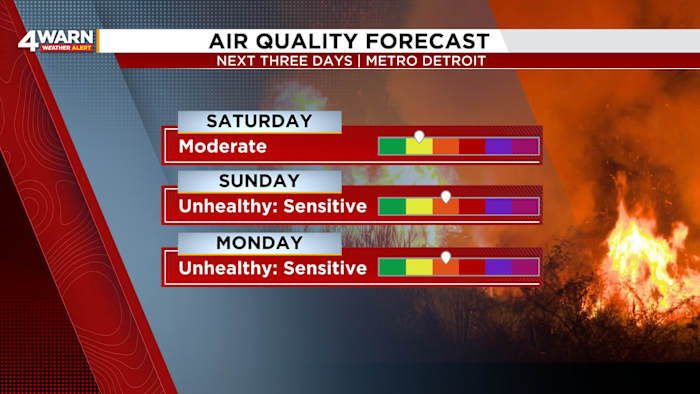Lansing recently ranked as one of the top 14 cities in Michigan serving up barbecue in a survey by a nationwide lawncare services company.
Michigan has a strong BBQ game, according to a recent survey from Lawnstarter, which ranked nearly 476 major U.S. cities and found 14 in Michigan, including Lansing, served up tasty barbecue.
Several restaurants in Lansing have received awards for their reliable BBQ menus, including Meat Southern BBQ and Carnivore Cuisine, and the Smoke ‘N Pig BBQ.
Here are five barbecue restaurants to explore in Lansing.
Lansing’s Meat Southern BBQ and Carnivore Cuisine
What began as a backyard barbeque turned into an award-winning BBQ restaurant recognized at a local and national scale.
“Our delectable eats have been featured on both ‘Triple D’ and ‘Campus Eats’ on the Big10 Network. We had a great time sharing our passion for BBQ and showing the world what Makes Meat BBQ tick,” Meat said.
For appetizers, customers can choose between the nachos, meat fries or smoked wings. Avoid filling up because their entrees include the “meat mountain,” which is a heap of potatoes, gravy, brisket, bacon and more. Meat plates are also included, such as, a half pound of pulled pork or chicken, smoked turkey and brisket.
Located at 1224 Turner Road in Old Town, the restaurant is open 11 a.m. to 9 p.m. from Tuesday-Saturday, and from noon to 6 p.m. on Sunday.
Smoke ‘N Pig BBQ has another loaded BBQ menu in Lansing
Another Lansing BBQ spot, Smoke ‘N Pig BBQ, evolved from a food truck to an award-winning restaurant. They previously competed in the Smokin’ Jazz and BBQ Blues Festival: This is a place that knows it’s a hometown favorite.
“Our smoked BBQ menu is packed full of all the smokey classics, from pulled pork to ribs to spicy rib tips. We also smoke Lansing BBQ favorites such as beef brisket and chicken wings,” Smoke ‘N Pig says.
Located at 908 Elmwood Road, the restaurant is open from 11 a.m. to 9 p.m. Tuesday-Thursday. From 11 a.m. to 10 p.m. on Friday-Saturday. Then, from noon to 8 p.m. on Sunday.
Some of their popular items are the loaded mac n’ cheese, pulled pork tacos, pulled pork nachos and more.
Their menu, decorated in flames, includes pulled pork and brisket sandwiches, spicy rib tips, jumbo chicken, turkey ribs and loaded pork or brisket fries.
Saddleback BBQ in REO Town Lansing and Okemos
“Saddleback BBQ is Lansing, Michigan’s premier craft BBQ joint. We feature authentic southern BBQ with a unique Midwestern flair. We smoke all of our meats on site in our multiple reverse-flow, wood-fed smokers,” Saddleback says. “We use a mixture of hardwoods sourced from the mid-Michigan area, which includes, apple, cherry, and hickory.
The menu offers combo plates, so customers can order a variety of meats and sides. Their menu also includes gluten free and dairy free brisket, pulled pork, ribs and chicken.
There are two restaurant locations: REO town at 1147 S. Washington Ave., open from 11 a.m. to 7 p.m. Monday-Sunday; and Okemos at 1754 Central Park Dr., open from 11 a.m. to 8 p.m. Monday-Sunday.
Customers may order online as a delivery or “Pork & Go,” for a curbside pick-up. The kitchen also caters for events like weddings.
Gravity Smokehouse Brew & Que
At the Gravity Smokehouse, customers can browse the dinner menu, choosing between the BBQ flatbread or BBQ sandwiches while participating in one of their weekly events: music Bingo at 7 p.m. every Wednesday or trivia night at 7:30 p.m. every Tuesday.
According to the menu, specials include brisket philly, turkey bacon melt, BBQ nachos, gravity burger, brisket, sliced turkey, chili, BBQ cobb salad and their side of mac n’ cheese.
The smokehouse is located in Holt at 2440 Cedar St. and open from 7 a.m. to 10 p.m. Tuesday-Thursday; from 7 a.m. to midnight Friday-Saturday; and from 7 a.m. to 8 p.m. on Sunday.
The kitchen also caters for events like weddings or business functions in Holt and Lansing.
Capital City BBQ
Capital City BBQ offers a unique menu, including Vietnamese entrees like egg rolls, noodle salad and the banh mi sandwich to classic barbecue meals like brisket, baby back ribs, smoked pulled chicken and pulled pork cheese fries.
On June 1, the restaurant celebrated it 10th anniversary in Lansing.
The kitchen also serves breakfast on the weekends, including breakfast eggrolls, bowls, homed biscuits and gravy, and the “piggyback ride,” an omelet stuffed with smoked ham with melted cheese.
According to Yelp, CCBBQ placed in the top 10 best BBQ restaurants in Lansing for 2025 — among Meat BBQ, Smoke ‘N Pig BBQ, Saddleback BBQ and the Gravity Smokehouse.
The restaurant is located at 1026 Saginaw St., and open from 11 a.m. to 7 p.m. Monday through Friday; from 8:30 a.m. to 7 p.m. on Saturday, and 8:30 a.m. to 3 p.m. on Sunday.
Contact Sarah Moore smoore@lsj.com




























